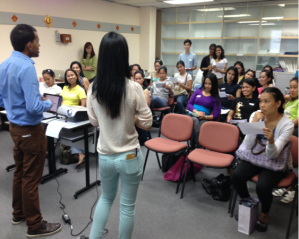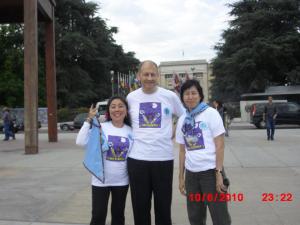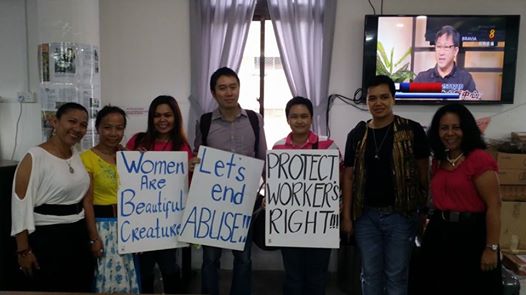Rohini*, a domestic worker from Sri Lanka, met Sandeep, a Singaporean of Tamil descent, on the Internet. They chatted frequently, and Sandeep courted Rohini, wowing her with promises of love and marriage, and a good life in Singapore. When they finally met in real life, Rohini fell in love.
‘Day by day he was closer to my heart, and gave me hope of marriage.’
One day, Sandeep told Rohini he would like her to meet his parents. Happy to meet her prospective in-laws, Rohini followed Sandeep to his family home, only to find the parents absent. There, Sandeep argued forcefully that since they were getting married soon, they should consummate the relationship. Rohini preferred to wait, but eventually gave in.
A few weeks later Rohini found out she was pregnant. Sandeep was happy when he heard the news, renewed his promises of marriage, and took her to see a doctor. As Rohini was struggling with her tasks as a domestic worker, he suggested she go back to her parents in Sri Lanka to rest, for the benefit of the child. Sandeep sent her some money, but not nearly enough to support an expecting mother. She had to borrow money to pay her medical bills. Last November, Rohini gave birth to a little girl, Marika.
‘It is difficult to live in this society with a fatherless baby.’
Soon after Marika was born, Rohini never heard from Sandeep again. His number had been disconnected. Being a single mother is not easy in a conservative society like Sri Lanka, especially as Rohini’s family is poor. With a young baby to take care of, Rohini could not find a new job to pay off her loans. She decided to return to Singapore to find the child’s father and force him to take responsibility for her. Rohini filed a case with the Singapore Family Court for maintenance for his daughter.
‘My intention is to find him, marry him, and give my innocent daughter her father’s protection and love.’
Rohini still had hopes to marry Sandeep. But when the Court tracked him down, it turned out Sandeep had a wife already. HOME arranged for Rohini to be assisted by a pro bono lawyer, and eventually a financial settlement was agreed on.
‘If he rejects to marry me, I have no choice expect asking him for compensation.’
Rohini is happy with the outcome of the case. Even though she has not managed to convince Sandeep to marry her, her immediate financial problems are now solved. But she still has to face the shame of being a single mother, and raise her daughter alone. Just before being driven to the airport by Sandeep, she told HOME she was glad about her ‘happy ending.’
‘I am happy, I can give my daughter a future now.’
Rohini did not realise that under Singapore law, domestic workers are not allowed to marry Singaporean men without authorisation from the government. Pregnancy results in immediate deportation, and domestic workers often feel pressured to undergo abortion just to keep their jobs.
Rather than repatriate foreign domestic workers when they become pregnant, Hong Kong grants ten weeks of maternity leave to those that choose to return to work after they give birth. In this way the mothers can provide for their young children, which is especially important if they are a single parent.
Even if their partners are willing to ‘do the right thing’ and take responsibility for their actions, Singapore law does not encourage them to do so. Authorisation to get married is difficult to obtain, and living together unmarried is not socially accepted in many communities.
The result is that these children are likely to grow up in poverty, with a mother that is ostracised by society, and sometimes even rejected by her own family. It is in the best interest of the child that fathers are held accountable for their children’s upkeep.
During her stay in Singapore Rohini stayed at the HOME shelter, and was assisted with legal advice, a pro bono lawyer and supplies for her baby. Help HOME help others like her by donating at
* Rohini and Sandeep’s names have been changed to protect their privacy












